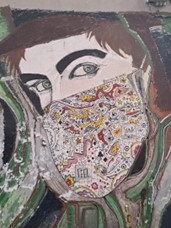
Awatef Ketiti
Youth urban art experiences in Italy
After exploring street art and its relationship with youth activism and the transformation of public space in Tunisia during the first stay, the geographical scope of the research was extended to cover youth urban art experiences on the other side of the Mediterranean, and precisely in Italy, during the second stay. Although the socio-political and economic realities of the two countries are very different, the comparative approach has shed light on the specificities of an incipient urban art experience born in a context of popular revolution aiming to liberate public space from dictatorship, as is the case in Tunisia, and another urban art experience rooted in democracy, as is the case in Italy. Preliminary results reveal a constant yearning for freedom that germinates in urban art whether it is found in the context of democracy or dictatorship. Urban art in Italy was born as a rebellious artistic movement against the canonisation of aesthetics, social marginalisation, the appropriation of public space and the dominant mercantile logic. Today, however, it faces the threat of being used by an urban policy that aims to reduce tensions in marginalised peripheral neighbourhoods where a high level of delinquency and criminality prevails, without providing real solutions for social integration. This instrumentalisation undermines the activist and protest philosophy of urban art by turning it into art that is allied, financed and directed by the authorities. The new formulas for recovering the public space of clandestine artistic denunciation consist of the organisation of directed urban art workshops in marginalised neighbourhoods through the concession of spaces ceded by the authorities. These strategies are the essence of urban art, which was born in the street to be free, anonymous, spontaneous and rebellious against the system The focus of the research has centred on this mutation that street art undergoes when it is instrumentalised by power. The methodology was based on bibliographic research, participant observation and qualitative interviews with urban local artists.
